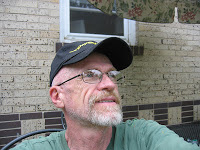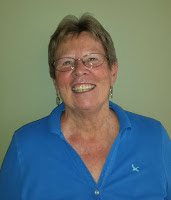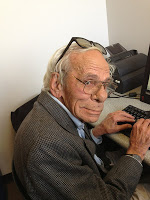By March 1968, I was fresh out of Air Force basic training and assigned to Goodfellow AFB, Texas, where I entered training to become a “radio intercept analyst.” These are the military personnel who work from remote and isolated locations, like mountain tops, listening to radio transmissions from countries to collect secret intelligence data. Of all the jobs that were available when I was still in basic training, this one seemed the most interesting and challenging.
I completed phase-one training with the highest score in my class. All thirty graduates of the class performed base details for three months while awaiting the Top Secret phase-two training to begin. I never entered the second phase of training because of a doctor; the base psychiatrist to be specific.
Some background information is needed here for clarification as the story unfolds. From the age of 10 in 1958 until I left home for college at 18 in 1966, I lived in what is now known as South Lake Tahoe. I had little to no social life outside of weekly Boy Scout meetings and periodic campouts because my ten-year younger twin brother and sister needed babysitting. Our parents were alcoholics and were mostly absent during the week until 1 or 2 AM, after the bars closed.
Consequently, I became very naïve about life in general and living in the adult world. Emotionally incomplete I was not prepared to face college away from home and continued to have no social life maintaining a hermit-like existence. As a result, I failed my first year of college and needed to join the Air Force in 1967 to avoid being drafted into the army or worse yet, the marines.
At Goodfellow AFB, I continued to be socially awkward and so rapidly developed a case of home-sickness. I requested my commander or first sergeant to let me talk to a counselor, but no appointment was ever made. During the break between classes, an investigator interviewed all of us waiting for the next phase of training to begin. His purpose was to gather enough information to complete a background check to see if we could be cleared to have access to Top Secret material.
During my interview, he asked me if I ever had any homosexual experiences. I told him that a friend and I once mutually masturbated each other when we were 16. He then asked if I had ever talked to a psychiatrist about it. I replied that, I had read such behavior was considered “normal” so I wasn’t worried about it. He inquired how I was “doing” in the military environment and I replied that I was a bit home-sick but otherwise okay. He wanted to know if I wanted to talk to someone about it and I told him that my commander or first sergeant was supposed to be getting me an appointment but nothing had occurred yet. He told me don’t worry, I will get you one. One week later I had my first appointment, not with a counselor but with the base psychiatrist.
I don’t really remember his face or specific age, but I do remember that he was not “old” or “elderly” in my point of view. That first visit took place about 2PM in his assigned offices. The female receptionist took me to an examination room, told me to undress down to my shorts, and the doctor would be with me in a few minutes. I did as she asked. The doctor came in and introduced himself and told me to sit on the exam table. He then proceeded to give me what was a common physical examination which included the “turn-your-head-and-cough” hernia check. I was too young to need a prostate check, thank goodness.
After the exam, he had me dress and meet with him in his office so we could talk about why I was there. I told him about the home-sickness and we talked for the remainder of an hour. Over the next few weeks, I met with him four or five more times. The only difference was each of those following times, the appointment was at 4:45 PM and so the receptionist would leave for the day prior to the doctor seeing me. In other words, we were alone in the building. Each time he began our sessions by giving me a complete physical exactly the same as before. I always wondered why at the time, but he was an officer and a doctor. As a doctor I didn’t question him and since I was taught to obey all officers, I didn’t question him either; I just did what I was told to do.
The very last appointment was different. It began benignly enough with the physical exam, but this time after having me stand for the hernia check he had me lay back down on the table naked (with my hands at my side) and began to ask me questions about my relationships with my relatives and friends back home; questions we had discussed in our previous meetings in his office. Partway through the questioning he began to flip my penis back and forth using his index finger. I was surprised to say the least, but as I said previously, he was a doctor and an officer so I said nothing other than to answer his questions.
It is said that men think with their penis. It is not possible for the penis to think, but I can tell you it is completely difficult for the brain to concentrate while the penis is demanding attention and more blood. By the time he asked me about my relationship with my father I was nearly brain dead for speech. My penis was only half erect and I told him that he should stop. He said, “Why?” and I replied, “Because you are beginning to turn me on.” He said, “You let me worry about that.” and continued to flip it back and forth. He suddenly switched from flipping it to masturbating it slowly, but it only got a bit more erect. By this time he was not asking any more questions. Shortly, he asked me if my penis got harder. I told him it did and he told me to make it hard. So now I became the one masturbating myself in front of him. I was so nervous that after about two minutes my penis would not get any more erect than 75% of what was possible. I stopped and told the doctor and he told me to get dressed and come to his office.
Once in his office, he wanted to know what I had meant when I said he “…was turning me on.” I explained that I only meant he was giving me an erection. He then told me he was removing me from further training because he did not think I “… could stand the strain of an isolated or remote assignment.” I was shocked and dismayed and pleaded with him not to do this; but to no avail.
Soon thereafter, I was transferred to Hurlburt Field (Eglin Auxiliary Field #9) near Ft. Walton Beach, Florida, 50-miles east of Pensacola. (This was the airfield that General Doolittle trained his pilots and aircrews for the 30-seconds over Tokyo attack during WW2.) When I left Goodfellow AFB, I just put the memory away as unimportant because I did not know or recognize that he had done something illegal and totally unethical. The rest of my life continued from that point and location, but in a different direction from what I had been expecting.
Strangely enough, in my official Air Force medical records, the only record of my appointments with the psychiatrist is of the first appointment. None of the rest are documented in my medical records and any mental health records are also missing or non-existent. It would be quite surprising, if the doctor had left a medical record of his molesting a patient.
Does anyone else have a similar experience with a military or civilian doctor?
About the Author
I was born in June of 1948 in Los Angeles, living first in Lawndale and then in Redondo Beach. Just prior to turning 8 years old in 1956, I began living with my grandparents on their farm in Isanti County, Minnesota for two years during which time my parents divorced.
When united with my mother and stepfather two years later in 1958, I lived first at Emerald Bay and then at South Lake Tahoe, California, graduating from South Tahoe High School in 1966. After three tours of duty with the Air Force, I moved to Denver, Colorado where I lived with my wife and four children until her passing away from complications of breast cancer four days after the 9-11 terrorist attack.
I came out as a gay man in the summer of 2010. I find writing these memories to be therapeutic.
My story blog is TheTahoeBoy.Blogspot.com









